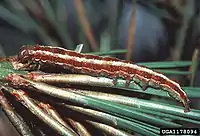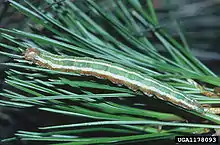Zale helata
Zale helata, the brown-spotted zale, is a moth of the family Noctuidae. The species was first described by James Halliday McDunnough in 1943. It is found in barrens and pine woodlands from Manitoba to Maine, south to northern Alabama and Texas.

Southern variant
| Zale helata | |
|---|---|
 | |
| Northern variant | |
| Scientific classification | |
| Domain: | Eukaryota |
| Kingdom: | Animalia |
| Phylum: | Arthropoda |
| Class: | Insecta |
| Order: | Lepidoptera |
| Superfamily: | Noctuoidea |
| Family: | Erebidae |
| Genus: | Zale |
| Species: | Z. helata |
| Binomial name | |
| Zale helata McDunnough, 1943 | |
| Synonyms | |
| |
The wingspan is 35–41 mm. Adults are on wing from May to June. There is one generation per year.
The larvae feed on hard and soft pines (especially Pinus virginiana (scrub or Virginia pine) in the south) and rarely on larch. They feed on young needles that are not yet fully hardened.
External links
- "931039.00 – 8704 – Zale helata – Brown-spotted Zale Moth – (Smith, 1908)". North American Moth Photographers Group. Mississippi State University. Retrieved December 13, 2019.
- Cotinis (May 22, 2019). "Species Zale helata - Brown-spotted Zale - Hodges#8704". BugGuide. Retrieved December 13, 2019.
- "Brown-spotted Zale (Zale helata)". Forest Pests. Archived October 31, 2007. With larval stage info.
This article is issued from Wikipedia. The text is licensed under Creative Commons - Attribution - Sharealike. Additional terms may apply for the media files.